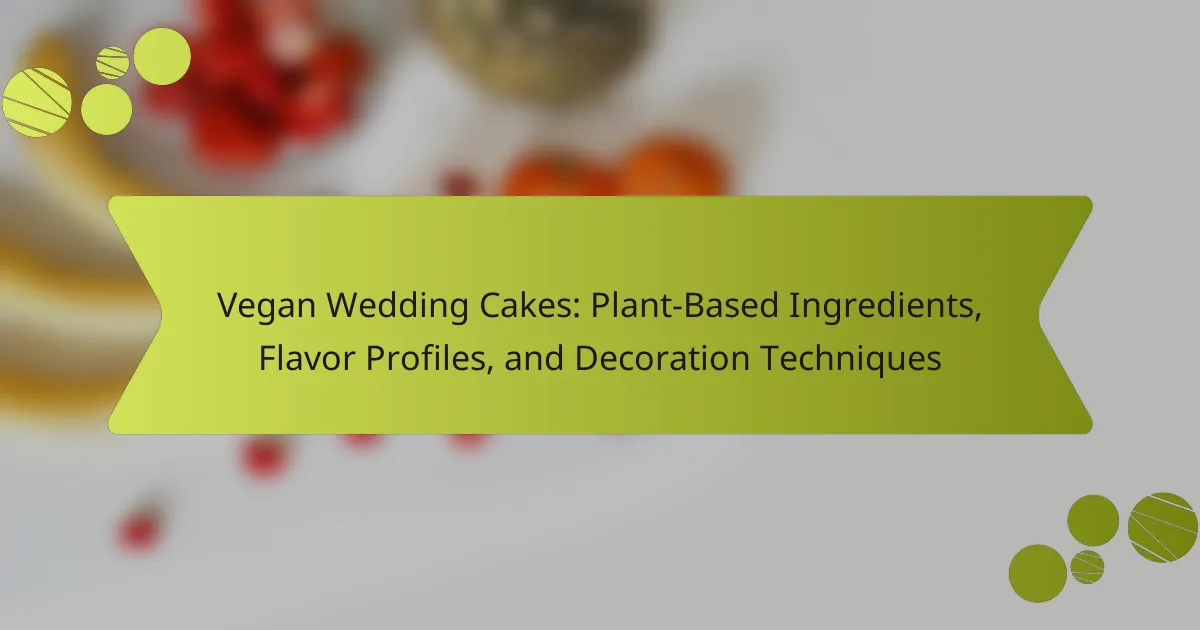Vegan wedding cakes are cakes made without any animal products, utilizing plant-based ingredients such as flour, sugar, and non-dairy milk. Common egg substitutes include applesauce, flaxseed, and aquafaba, ensuring these cakes remain moist and flavorful. Popular flavor profiles range from chocolate and vanilla to lemon and red velvet, while various decoration techniques, including fondant and non-dairy frosting, enhance their visual appeal. Vegan wedding cakes cater to those following a vegan diet or with dairy allergies, providing a compassionate and delicious option for wedding celebrations.
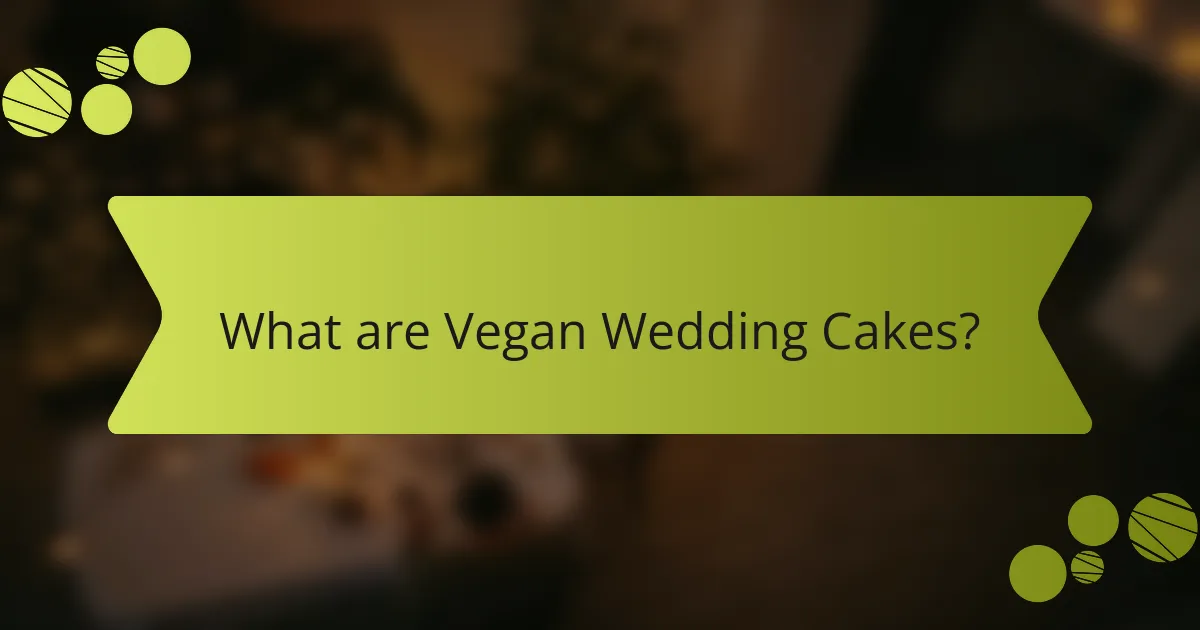
What are Vegan Wedding Cakes?
Vegan wedding cakes are cakes made without any animal products. They typically use plant-based ingredients such as flour, sugar, and non-dairy milk. Common substitutes for eggs include applesauce, flaxseed, or aquafaba. Vegan cakes can be just as flavorful and moist as traditional cakes. They cater to those following a vegan diet or with dairy allergies. Many bakers offer a variety of flavors, including chocolate, vanilla, and fruit-based options. Vegan wedding cakes can be decorated with non-dairy frostings and edible flowers. They provide a compassionate choice for wedding celebrations.
How do Vegan Wedding Cakes differ from traditional wedding cakes?
Vegan wedding cakes differ from traditional wedding cakes primarily in their ingredients. Traditional wedding cakes often contain eggs and dairy, such as milk and butter. In contrast, vegan wedding cakes use plant-based alternatives. Common substitutes include applesauce, flaxseed, or aquafaba for eggs. Non-dairy milk, coconut oil, or vegan butter replace dairy products.
Flavor profiles can also differ. Vegan cakes may have a lighter texture due to the absence of eggs. However, skilled bakers can achieve rich flavors using natural ingredients like fruits and spices. Decoration techniques remain similar, but vegan fondants and icings are often made from plant-based ingredients.
These distinctions cater to those with dietary restrictions while maintaining the celebratory essence of a wedding cake.
What ingredients are commonly used in Vegan Wedding Cakes?
Common ingredients in vegan wedding cakes include flour, sugar, plant-based milk, and vegetable oils. Many recipes also incorporate baking powder or baking soda as leavening agents. Additionally, applesauce or mashed bananas often serve as egg substitutes. Other common ingredients are cocoa powder for chocolate cakes and vanilla extract for flavor. Some cakes may include nuts or seeds for added texture. Fruits like berries or citrus can enhance flavor profiles. Lastly, vegan butter or margarine is frequently used for frosting. These ingredients ensure that the cakes are both delicious and suitable for a vegan diet.
How do the baking techniques vary for Vegan Wedding Cakes?
Baking techniques for vegan wedding cakes differ primarily due to the absence of eggs and dairy. Instead of eggs, bakers often use substitutes like flaxseed meal, chia seeds, or applesauce for binding. These alternatives can alter the texture and moisture of the cake.
Vegan cakes may require adjustments in baking time and temperature. Without eggs, the cakes may rise differently and take longer to set. Additionally, the choice of plant-based milk impacts the flavor and density of the cake.
Incorporating ingredients like aquafaba can mimic egg whites for a lighter texture. Vegan butter or coconut oil is typically used instead of dairy butter, influencing both flavor and moisture levels.
Frosting techniques also vary, with options like vegan cream cheese or coconut whipped cream. These substitutions create unique flavor profiles that differ from traditional cakes.
Overall, the techniques emphasize moisture retention and proper rising to achieve desirable textures in vegan wedding cakes.
What are the benefits of choosing Vegan Wedding Cakes?
Vegan wedding cakes offer health benefits, ethical considerations, and environmental advantages. They are typically lower in cholesterol and saturated fat. This can contribute to better heart health. Vegan cakes often use natural sweeteners and whole ingredients. These choices can enhance nutritional value.
Ethically, vegan cakes avoid animal products. This aligns with the values of many couples who prioritize animal welfare. Environmentally, plant-based baking has a lower carbon footprint. Studies show that reducing animal product consumption can significantly decrease greenhouse gas emissions.
Choosing vegan wedding cakes can cater to diverse dietary needs. They are suitable for guests with dairy allergies or lactose intolerance. This inclusivity can enhance the overall experience for all attendees.
How do Vegan Wedding Cakes cater to dietary restrictions?
Vegan wedding cakes cater to dietary restrictions by using plant-based ingredients. These cakes avoid dairy and eggs, making them suitable for vegans and those with lactose intolerance or egg allergies. Common substitutes include almond milk, coconut cream, and flaxseed meal. These alternatives provide moisture and binding without animal products. Vegan cakes can also be made gluten-free, accommodating those with gluten sensitivities. Many recipes utilize natural sweeteners like agave or maple syrup, which are often easier for those with sugar restrictions. Additionally, vegan wedding cakes can be customized to exclude nuts or specific allergens upon request. This flexibility allows couples to create a cake that meets their guests’ dietary needs.
What environmental benefits are associated with Vegan Wedding Cakes?
Vegan wedding cakes offer significant environmental benefits. They typically require fewer natural resources compared to traditional cakes. For instance, plant-based ingredients generally have a lower carbon footprint. Studies show that animal agriculture contributes to greenhouse gas emissions. Vegan cakes eliminate the need for dairy and eggs, reducing these emissions. Additionally, plant-based farming often uses less water and land. According to the Water Footprint Network, producing plant-based foods requires less water than animal products. Overall, choosing vegan wedding cakes supports sustainable practices and reduces environmental impact.
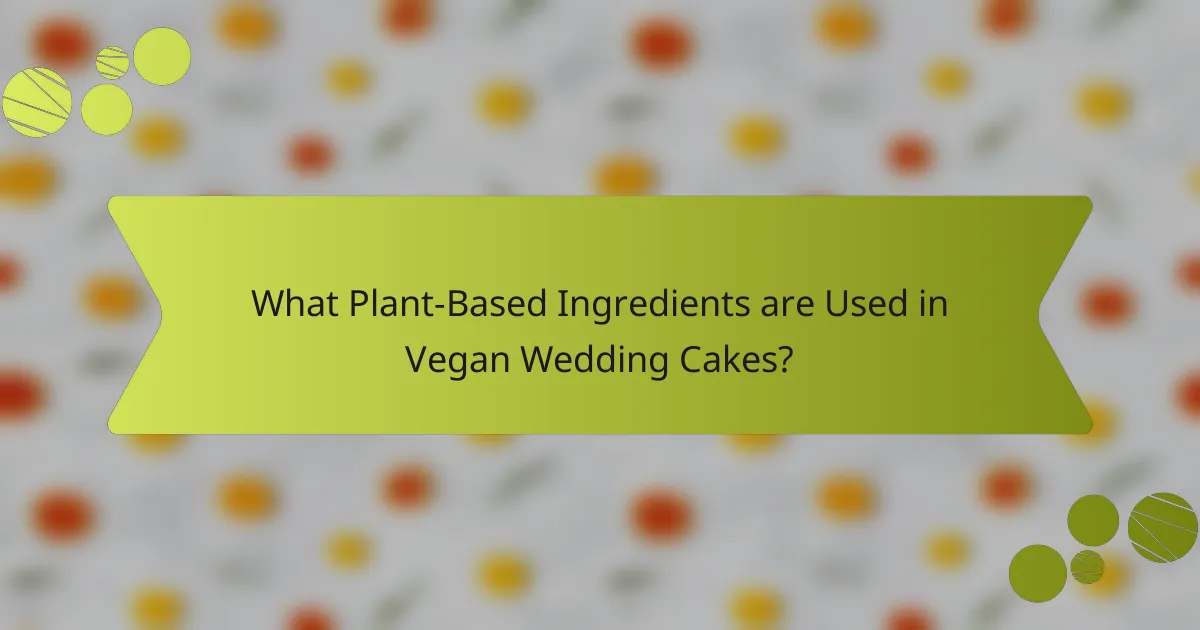
What Plant-Based Ingredients are Used in Vegan Wedding Cakes?
Vegan wedding cakes use various plant-based ingredients. Common ingredients include flour, sugar, and plant-based milk. Popular flour types are all-purpose, almond, and coconut flour. Sugar options often include cane sugar and coconut sugar. Plant-based milk choices include almond, soy, and oat milk.
To replace eggs, ingredients like flaxseed meal or applesauce are frequently used. Additionally, vegan butter or coconut oil serves as a fat source. Natural sweeteners like maple syrup or agave nectar may also be included. These ingredients ensure that the cake remains moist and flavorful while adhering to vegan dietary restrictions.
Which flours are best for Vegan Wedding Cakes?
Almond flour, coconut flour, and whole wheat flour are the best options for vegan wedding cakes. Almond flour provides a moist texture and nutty flavor. Coconut flour is highly absorbent and adds a subtle sweetness. Whole wheat flour contributes to a denser structure and earthy taste. These flours are gluten-free or whole grain alternatives, making them suitable for various dietary preferences. Almond flour contains healthy fats and protein, while coconut flour is rich in fiber. Whole wheat flour offers more nutrients compared to refined flours. These attributes make them ideal for creating delicious vegan wedding cakes.
What are the properties of gluten-free flours in baking?
Gluten-free flours have distinct properties that affect baking. They lack gluten, which provides elasticity and structure in traditional flours. This absence can lead to denser baked goods. Gluten-free flours often require binding agents, such as xanthan gum or psyllium husk, to mimic gluten’s effects. They can absorb more liquid than wheat flour, which may alter texture and moisture levels. Common gluten-free flours include almond, coconut, and rice flour, each contributing unique flavors and textures. For instance, almond flour adds richness, while coconut flour imparts a subtle sweetness. Understanding these properties is essential for achieving desirable results in gluten-free baking.
How do different flours affect the texture of the cake?
Different flours significantly affect the texture of a cake. For example, all-purpose flour creates a balanced texture with moderate density. Cake flour, which has a lower protein content, produces a lighter and fluffier cake. Whole wheat flour adds a denser texture and a nutty flavor due to its bran and germ content. Almond flour results in a moist and tender cake because of its fat content. Each flour type impacts gluten formation, which influences the cake’s rise and crumb structure. Research shows that gluten strength varies by flour type, affecting overall cake quality.
What substitutes are available for eggs in Vegan Wedding Cakes?
Common substitutes for eggs in vegan wedding cakes include flaxseed meal, chia seeds, applesauce, and silken tofu. Flaxseed meal and chia seeds can be mixed with water to create a gel-like consistency, which helps bind ingredients. Typically, one tablespoon of flaxseed meal or chia seeds mixed with three tablespoons of water replaces one egg. Applesauce adds moisture and sweetness while providing binding properties. Generally, a quarter cup of applesauce can substitute for one egg. Silken tofu, when blended until smooth, can replace eggs by providing a creamy texture. About a quarter cup of silken tofu is equivalent to one egg. These substitutes effectively maintain the cake’s structure and moisture, ensuring a successful vegan wedding cake.
How do common egg substitutes impact flavor and texture?
Common egg substitutes can significantly alter both flavor and texture in baking. For instance, applesauce adds moisture but may impart a slight sweetness. This can lead to a denser texture in cakes. Flaxseed meal creates a chewy texture, resembling that of eggs, but has a nutty flavor. Chia seeds also contribute a similar texture, though they may add a slight crunch. Silken tofu provides creaminess, making it suitable for rich desserts, but it can neutralize flavors. Aquafaba, the liquid from chickpeas, mimics egg whites, providing lightness without altering taste. Each substitute has unique properties that affect the final product’s taste and mouthfeel.
What are the best ratios for egg replacements in baking?
The best ratios for egg replacements in baking vary depending on the substitute used. Common replacements include applesauce, mashed bananas, flaxseed meal, and aquafaba. For applesauce, use 1/4 cup to replace one egg. For mashed banana, the ratio is also 1/4 cup per egg. Flaxseed meal requires 1 tablespoon mixed with 2.5 tablespoons of water for one egg. Aquafaba, the liquid from canned chickpeas, can replace one egg with 3 tablespoons. These ratios are effective in maintaining moisture and binding in baked goods. They are widely recognized in vegan baking practices.
What types of sweeteners can be used in Vegan Wedding Cakes?
Vegan wedding cakes can utilize various plant-based sweeteners. Common options include maple syrup, agave nectar, and coconut sugar. These sweeteners provide natural sweetness without animal products. Maple syrup is a liquid sweetener derived from the sap of maple trees. Agave nectar is extracted from the agave plant and has a low glycemic index. Coconut sugar is made from the sap of coconut palm flowers and retains some nutrients. Other options include date sugar and brown rice syrup. Date sugar is made from ground dried dates, while brown rice syrup is produced from fermented brown rice. Each sweetener offers distinct flavors and sweetness levels suitable for vegan cakes.
How do natural sweeteners compare to refined sugars?
Natural sweeteners are generally considered healthier alternatives to refined sugars. They often contain more nutrients and have a lower glycemic index. For example, honey and maple syrup provide vitamins and minerals not found in table sugar. Natural sweeteners may also have antioxidant properties. In contrast, refined sugars offer empty calories without nutritional benefits. Studies show that excessive refined sugar intake can lead to health issues like obesity and diabetes. In moderation, natural sweeteners can enhance flavor while providing some health benefits.
What is the impact of sweeteners on the cake’s moisture level?
Sweeteners significantly impact a cake’s moisture level. They attract and retain moisture during baking. This moisture retention helps maintain the cake’s texture and softness. Different sweeteners, like agave syrup or maple syrup, have varying moisture content. For instance, liquid sweeteners can add more moisture than granulated sugar. Studies show that cakes made with liquid sweeteners often have a denser, moister crumb. Additionally, the chemical composition of sweeteners affects how they interact with other ingredients. This interaction can enhance or diminish the overall moisture level in the final product.
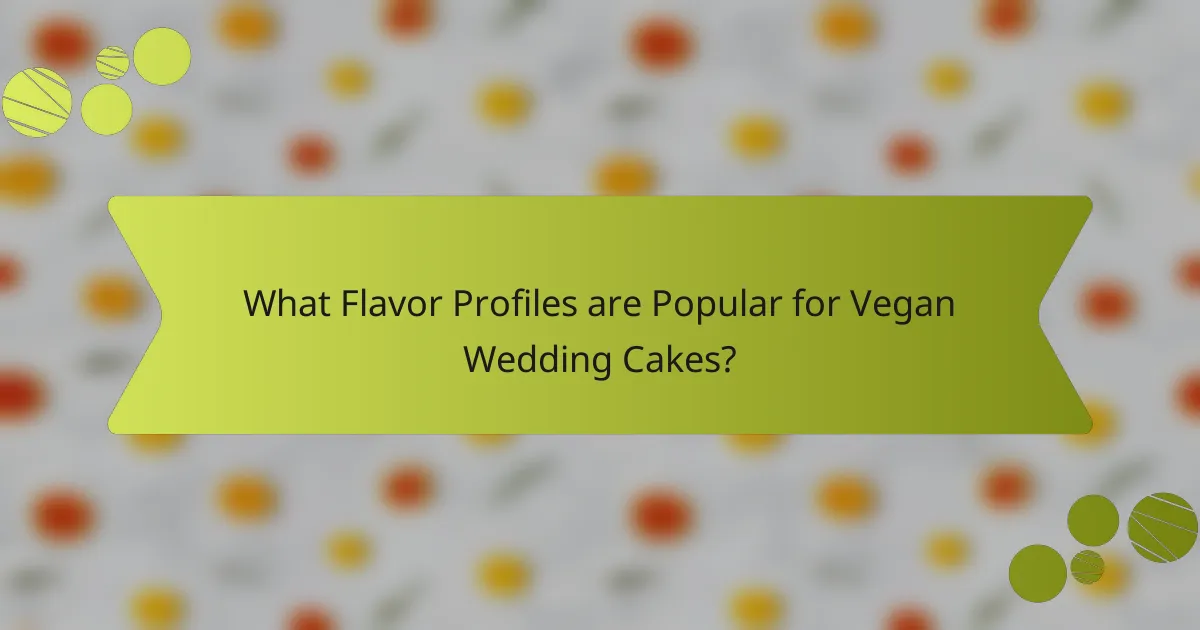
What Flavor Profiles are Popular for Vegan Wedding Cakes?
Popular flavor profiles for vegan wedding cakes include chocolate, vanilla, lemon, and red velvet. Chocolate is a classic choice, often made with cocoa powder and dairy-free alternatives. Vanilla offers a light, sweet flavor and is commonly paired with fruit fillings. Lemon provides a refreshing citrus taste, ideal for spring and summer weddings. Red velvet is known for its rich color and subtle cocoa flavor, typically enhanced with plant-based cream cheese frosting. Other trending flavors include matcha, coconut, and almond, reflecting diverse tastes. These profiles cater to various preferences while ensuring the cakes remain delicious and plant-based.
What are the trending flavors for Vegan Wedding Cakes?
The trending flavors for vegan wedding cakes include chocolate, vanilla, and lemon. Chocolate remains a favorite due to its rich taste and versatility. Vanilla offers a classic flavor that pairs well with various fillings. Lemon provides a refreshing option, especially during warmer months. Other popular flavors are red velvet, coconut, and carrot. Red velvet adds a unique color and flavor profile. Coconut brings a tropical twist, while carrot offers a spiced sweetness. These flavors cater to diverse palates and enhance the celebratory experience.
How do seasonal ingredients influence flavor choices?
Seasonal ingredients significantly influence flavor choices by providing fresh, vibrant tastes that reflect the time of year. In spring, ingredients like strawberries and rhubarb offer bright, tart flavors. Summer brings ripe peaches and berries, enhancing sweetness and juiciness. Autumn introduces spices like cinnamon and pumpkin, adding warmth and comfort. Winter features citrus fruits, which provide refreshing acidity. Seasonal availability also encourages creativity, as bakers experiment with local produce. This practice aligns with consumer preferences for freshness and sustainability. Research shows that seasonal eating can enhance flavor perception and enjoyment, making it a key consideration in flavor choices for vegan wedding cakes.
What unique flavor combinations are gaining popularity?
Unique flavor combinations gaining popularity include lavender and lemon, matcha and coconut, and chocolate and chili. These combinations offer a balance of floral, citrus, tropical, and spicy notes. Lavender and lemon provide a refreshing taste, making them ideal for spring weddings. Matcha and coconut create a rich, earthy flavor profile, appealing for modern celebrations. Chocolate and chili add warmth and depth, attracting couples looking for bold choices. According to recent trends, these flavors enhance the overall experience of vegan wedding cakes.
How can flavor enhance the overall wedding cake experience?
Flavor significantly enhances the overall wedding cake experience by creating memorable taste sensations. A well-chosen flavor profile can evoke emotions and complement the wedding theme. For example, popular flavors like vanilla, chocolate, or fruit can resonate with guests’ preferences. Unique flavors, such as lavender or matcha, can intrigue and surprise guests. Flavor also plays a crucial role in pairing with other elements, such as fillings and frostings, to create a harmonious dessert. Statistics show that 70% of guests remember the taste of the wedding cake long after the event. Thus, flavor is essential for leaving a lasting impression.
What role does flavor play in cake design and presentation?
Flavor is a critical element in cake design and presentation. It significantly influences the overall enjoyment of the cake. A well-balanced flavor profile enhances the visual appeal and complements the cake’s decoration. For instance, a rich chocolate cake can be adorned with elegant designs that reflect its indulgent taste. Flavor also guides the choice of complementary ingredients, such as fruits or spices, which can elevate the cake’s aesthetic. According to a study published in the Journal of Culinary Science & Technology, flavor perception directly impacts consumer satisfaction and preference. This demonstrates that flavor is not just an afterthought but a fundamental aspect of cake design.
How can flavors be tailored to suit the couple’s preferences?
Flavors can be tailored to suit a couple’s preferences by conducting a detailed flavor consultation. This involves discussing their favorite tastes and any dietary restrictions. Couples can select from a variety of plant-based ingredients to create unique flavor profiles. Popular options include fruits, nuts, and spices that align with their preferences. Testing different combinations during a tasting session ensures satisfaction. Customization can also include adjusting sweetness levels or incorporating specific flavors like chocolate or citrus. This personalized approach enhances the overall wedding cake experience and ensures it reflects the couple’s individuality.
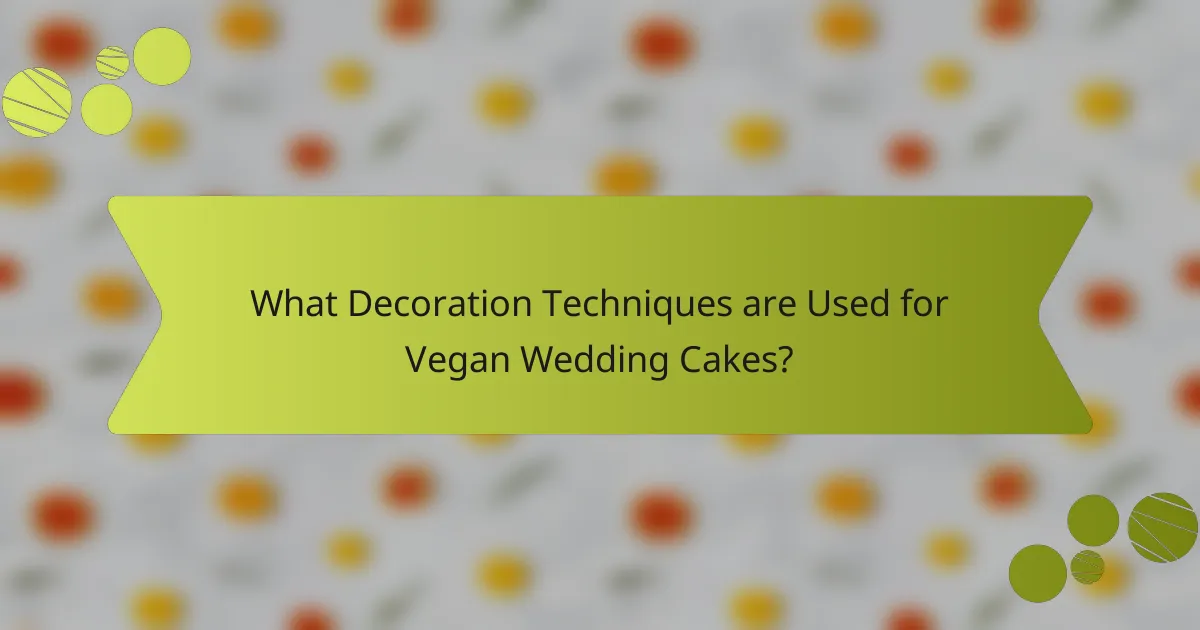
What Decoration Techniques are Used for Vegan Wedding Cakes?
Vegan wedding cakes utilize various decoration techniques to enhance their visual appeal. Common techniques include fondant covering, which provides a smooth finish. Buttercream frosting made from plant-based ingredients is also widely used for its versatility. Edible flowers are popular for adding natural beauty and color. Fruit decorations, such as berries and citrus slices, offer fresh, vibrant accents. Piping techniques allow for intricate designs and patterns on the cake surface. Additionally, cake toppers made from sustainable materials can personalize the cake. These techniques not only beautify vegan cakes but also align with the principles of plant-based celebrations.
What are the most popular frosting options for Vegan Wedding Cakes?
The most popular frosting options for vegan wedding cakes include vegan buttercream, cream cheese frosting, and coconut whipped cream. Vegan buttercream is made using plant-based butter and powdered sugar. It is versatile and can be flavored with various extracts. Cream cheese frosting uses vegan cream cheese and provides a tangy flavor. Coconut whipped cream is light and airy, made from chilled coconut cream. These options are widely favored for their taste and texture in vegan baking.
How do plant-based frostings differ in texture and flavor?
Plant-based frostings differ in texture and flavor primarily due to their ingredients. These frostings often use oils, nut butters, or plant-based milks instead of dairy. The texture can range from creamy to fluffy, depending on the emulsifiers used. For example, coconut cream creates a thick and rich frosting. In contrast, aquafaba can produce a lighter, airy texture similar to meringue.
Flavor profiles in plant-based frostings are influenced by the base ingredients. Nut butters add a nutty flavor, while cocoa powder contributes a rich chocolate taste. Additionally, the use of natural sweeteners like maple syrup or agave can impart unique flavors.
Research indicates that consumers often perceive plant-based frostings as less sweet than traditional options. This perception is due to the absence of refined sugars commonly found in dairy-based frostings. Overall, plant-based frostings offer diverse textures and flavors, appealing to various dietary preferences.
What are the best techniques for applying vegan frosting?
The best techniques for applying vegan frosting include using an offset spatula for smooth application. This tool allows for even spreading across the surface of the cake. A piping bag can create decorative designs and borders. It provides control over the amount of frosting dispensed. For a rustic look, a bench scraper can be used to create textured finishes. This technique enhances the visual appeal of the cake. Additionally, chilling the cake before frosting helps the vegan frosting set better. It prevents sliding and ensures a cleaner finish. Finally, using a turntable allows for easy access to all sides of the cake while applying frosting. This method promotes an even and professional appearance.
How can Vegan Wedding Cakes be decorated creatively?
Vegan wedding cakes can be decorated creatively using various techniques and materials. Edible flowers, such as pansies and violets, add natural beauty. Fresh fruits like berries or citrus slices provide vibrant colors and flavors. Vegan buttercream or whipped coconut cream can create smooth finishes and intricate designs. Fondant made from plant-based ingredients allows for elegant shapes and details. Hand-painted designs using vegan food coloring offer a personalized touch. Textured finishes, like ruffles or swirls, can enhance visual appeal. Finally, incorporating unique elements like dried fruits or nuts adds both decoration and flavor.
What are some unique decoration ideas for Vegan Wedding Cakes?
Unique decoration ideas for vegan wedding cakes include edible flowers, fresh fruit, and plant-based frosting. Edible flowers like pansies and roses add elegance. Fresh fruit can create vibrant colors and natural sweetness. Plant-based frosting options include coconut cream and aquafaba meringue. Nuts and seeds can be sprinkled for texture. Dried fruits can add a rustic touch. Geometric designs using fondant can create a modern look. Finally, personalized cake toppers made from sustainable materials can enhance individuality. These ideas ensure a beautiful and delicious vegan wedding cake.
How can edible flowers and fruits enhance cake aesthetics?
Edible flowers and fruits can significantly enhance cake aesthetics by adding vibrant colors and unique textures. These natural decorations create visual appeal that attracts attention. Flowers like pansies and violets bring bright hues, while fruits like berries add freshness. The contrasting colors of flowers and fruits can complement the cake’s base. Additionally, edible flowers can introduce delicate shapes and patterns. Fruits can be arranged in artistic ways, enhancing the overall design. Studies show that visually appealing cakes can increase perceived taste and desirability. This makes edible flowers and fruits not only decorative but also impactful in presentation.
What tips should couples consider when choosing a Vegan Wedding Cake?
Couples should consider several key factors when choosing a vegan wedding cake. First, they should prioritize plant-based ingredients. This ensures the cake aligns with their dietary preferences. Next, couples should explore flavor options. Popular vegan flavors include chocolate, vanilla, and fruit-infused varieties.
They should also inquire about the cake’s texture. Vegan cakes can differ in moisture and density compared to traditional cakes. Couples must ask about the frosting as well. Vegan frostings often use alternatives like coconut cream or vegan butter.
Additionally, couples should check for allergen information. Common allergens in vegan cakes can include nuts and gluten. Lastly, they should taste test before making a final decision. Many bakeries offer samples to ensure satisfaction with the flavor and texture.
Vegan wedding cakes are cakes made entirely from plant-based ingredients, excluding any animal products such as eggs and dairy. This article explores the various attributes of vegan wedding cakes, including common ingredients, baking techniques, and popular flavor profiles like chocolate and lemon. It also highlights the benefits of choosing vegan cakes, such as catering to dietary restrictions and offering environmental advantages. Additionally, the article discusses creative decoration techniques, including the use of edible flowers and fruits, to enhance the visual appeal of these cakes.
